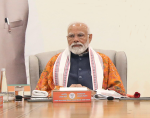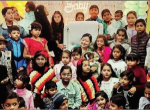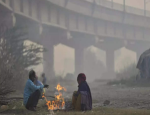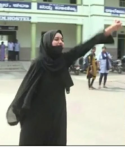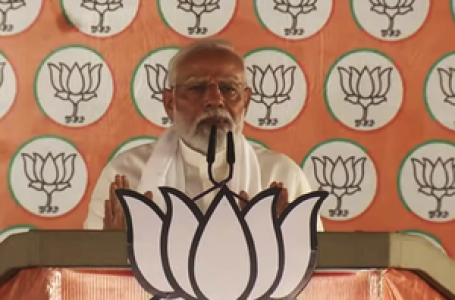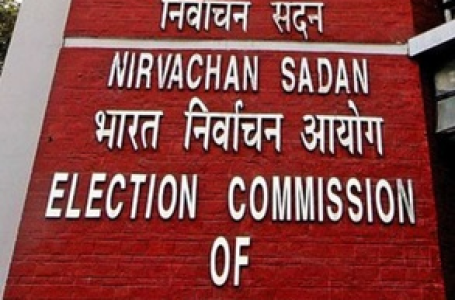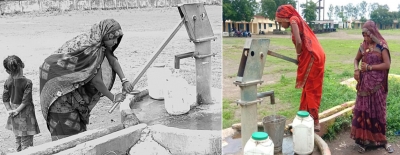
Ratlam: Parvati Parmar goes out to fetch water three times a day and it is just enough to meet the daily needs of her family of six. In total, she walks around 3km every day, carrying two pots of water from a nearby hand pump every time.
Parmar (26) lives in Mangrol village, located 7km from Ratlam in Madhya Pradesh, and is expecting her third child. She has to do the chore regularly, and her two children are always in tow.
“If I do not fetch water, work at the household will come to a standstill. Both my in-laws are aged, and my children are three and two years old. After their birth, water consumption in our household increased, and so did my trips to the hand pump,” says Parmar.
She wakes up at 6 am and rushes to the pump, located 400m from her house. The two pots of water that she brings back are used for activities related to making breakfast and lunch. In the afternoon, she is back at the pump to fetch more for washing clothes. Another trip ensues in the evening for cleaning utensils. If the family needs more water, she takes more trips.
Parmar is anxious about the child in her belly. “I get tired easily, and my body is weak. There were no complications when the first two were born. But this time, I was told during a check-up at the Anganwadi centre that I am anaemic.”
Sometimes, she has to stop to catch a breath midway; sometimes, she takes a break at the hand pump to gain her strength before starting her walk back home.
Bearing the brunt
Not only Mangrol, but other villages and development blocks, Dharad, Sailana, Bodina, Bajna and Dhabaipada, to name a few in Ratlam district have the same story to tell.
According to Urmila Pal, an auxiliary nurse midwife (ANM), around 200 women go through pregnancy annually in Dharad. Of them, 80% are anaemic.
In Mangrol, for example, 20 anaemic women walk to hand pumps, and queue up for two to three hours to fetch water. This, when pregnant women, especially in the first trimester, are advised against carrying heavy loads.
Satyendra Rajavat, the medical officer at Dharad’s primary health centre, however, does not see it as a problem. He says a pregnant woman may find it difficult to fetch water, but it still serves as an exercise.
“If she has to carry around five litres of water every day, it is not that much of a problem. Pregnant women need to be cautious during the first trimester, but they are also advised to exercise regularly,” says Rajavat, while warning that lifting more than 50kg elevates the risk of a miscarriage.
ANM Pal, however, says carrying heavy pails of water every day, while not getting enough rest and nutrition, exposes women to an array of pregnancy-related complications.
Rest and relaxation, a luxury
Ranu (25) from Bodina had to walk to a nearby tube well every day to get water, while also taking care of her family and performing daily chores. She suffered a miscarriage, according to accredited social health activist (ASHA) worker Madhu Goyal.
Another pregnant woman in the village, Kajal Nat’s haemoglobin has never gone beyond 9 gm/dL, despite taking iron tablets and injections. Her doctor has advised rest, but she still walks to the hand pump, though takes multiple breaks.
But neither Nat nor others have the luxury of rest. It is more important to quench the thirst of the families than to worry about probabilities.
Bodina ANM Sudha Rathore says neither illness nor pregnancy stops these women from doing their daily chores. Many women are taking care of the households alone as their husbands are out-of-station for work.
While richer families have tube wells, the marginalised women continue to bear the brunt.
The scourge of malnourishment
“It is my responsibility to ensure their well-being. But I can only do so much with the unavailability of basic resources like water. Even if you tell them not to, they will have to walk and exert themselves to fetch water. I still try to spread awareness on the importance of proper rest and care,” says Goyal.
The health indicators of women in the district are poor and, on top of that, there is a lack of basic awareness. “They do not boil water or strain it before drinking,” she informs, adding that most women in the village have low haemoglobin levels, which tamper with the body’s immune system and make them more susceptible to diseases.
Bodina’s ASHA worker Sangita says most among the 12 pregnant women and four breastfeeding mothers who registered last month at the Anganwadi centre have low haemoglobin.
Social worker and gynaecologist Padma Shri Leela Joshi, who has been working for women’s health for the past 30 years, says, “There is no direct link between water crisis and malnourishment. But, a pregnant woman walking long distances for water, that too in an anaemic condition, is definitely not right for her body.”
Professor Rekha Gupta, a gynaecologist at Ratlam Medical College, states that 80% of the outpatient women are anaemic. As per the National Family Health Survey, 77.2% of children in the four to 59 months age group are stressed due to low haemoglobin. Also, 72.7% of pregnant women are anaemic in rural Ratlam.
Cascading effects of stress
In addition to physical stress, women facing water crises also face mental stress. Result: hypertension, blood sugar and blood pressure are common ailments among them, which is more harmful to would-be mothers.
NFHS-5 conducted in Ratlam district found that 7.4% of the participating rural women had high blood sugar.
In addition, excess fluoride content in water triggers bone-related diseases and anaemia in Ratlam. As per the standard specifications, fluoride content in drinking water should range from 1 to 1.5 mg/l. However, in Bajna and Sailana development blocks, it is 8 to 9 mg/l. Not just Ratlam, another 43 districts in the state have recorded high fluoride content.
Dharad gram panchayat secretary Jeetendra Singh Chouhan says only 35 to 40 out of the 110 hand pumps are functional in the village.
While acknowledging the crisis, sarpanch Vijay Kunwar Rathod maintains that the panchayat polls have just concluded and “the newly-appointed team will ensure that water crisis does not hit us in the coming summer”.
“Though tube wells were installed in Rateetlai, Nyaykheda and Nyaypura, in addition to six new hand pumps, water problem got aggravated as the former stopped functioning,” claims Dinesh Gehlot, the former sarpanch of Dharad.
In Sailana development block’s Bodina village, efforts to bring tap water were made twice, and lakhs of rupees were spent, but in vain. “Now, we are forced to fetch water from Sailana,” rues Kanhaiyalal Patidar, a villager.
Earlier, a well was dug and a supply pipeline of one km length was laid under an irrigation project. Now, under the Jal Jeevan Mission, projects worth Rs 1.56 crore have been okayed, work for which is presently on.
Bodina’s sarpanch Badri Meena exudes confidence that the water crisis would end once the pipeline installation is complete.
(The author is a freelance journalist and a member of 101Reporters, a pan-India network of grassroots reporters)
–IANS







